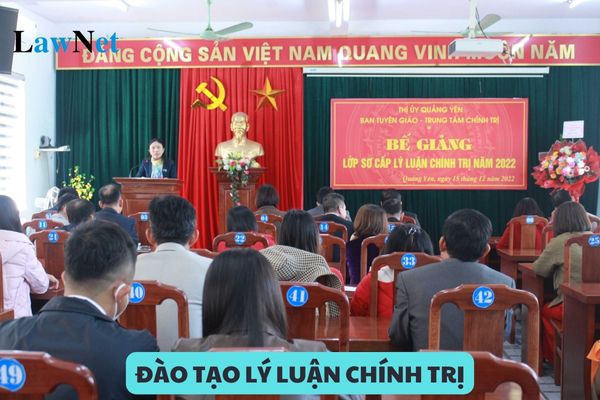What is political theory training according to the law in Vietnam? What are principles of political theory training in Vietnam?
What is political theory training according to the law in Vietnam?
Based on Clause 1, Article 3 of Regulation 57-QD/TW in 2022 on the interpretation of terms:
Interpretation of Terms
In this Regulation, the following terms are understood as follows:
- Political theory training is the process of imparting and absorbing a system of political theory knowledge; consolidating the worldview, human outlook, scientific and revolutionary methodology of Marxism-Leninism, Ho Chi Minh's ideology, viewpoints, and lines of the Communist Party, policies, laws of the State; enhancing political awareness and bravery, reinforcing faith in the Communist Party, the State, and socialist policies; improving vision, thinking, methods, management skills, and practical application for the team of officials. Political theory training consists of three levels: Basic, Intermediate, and Advanced.
...
Thus, political theory training is the process of imparting and absorbing a system of political theory knowledge; consolidating the worldview, human outlook, scientific and revolutionary methodology of Marxism-Leninism, Ho Chi Minh's ideology, viewpoints, and lines of the Communist Party, policies, and laws of the State.
The purpose of political theory training is to enhance political awareness and bravery, reinforce faith in the Communist Party, the State, and socialist policies; improve vision, thinking, methods, management skills, and practical application for the team of officials. Political theory training consists of three levels: Basic, Intermediate, and Advanced.

What is political theory training according to the law in Vietnam? What are principles of political theory training in Vietnam? (Image from the Internet)
What are principles of political theory training in Vietnam?
Based on Article 2 of Regulation 57-QD/TW in 2022, the principles of political theory training are:
- Adhering closely to the guidelines, resolutions, and regulations of the Communist Party on political theory training; organizing training for the right subjects, standards, according to the classification, and appropriate to the positions and titles of officials.
- Ensuring the uniformity and synchronization in political theory training associated with the Party's regulations on planning, appointment, nomination, and delegation of cadre management; clearly defining the responsibilities and authority of agencies in political theory training.
- Political theory study is an obligation, responsibility, and benefit of officials and party members, primarily the leading and managing cadres at various levels.
What are the standards for intermediate political theory?
Based on Article 5 of Regulation 57-QD/TW in 2022, the regulations on intermediate political theory are as follows:
Intermediate Political Theory
- Subjects
1.1. Officials and public employees
a) Members of the commune-level Party Committee; chairpersons, vice chairpersons of People's Councils, People's Committees; heads and vice heads of the Vietnam Fatherland Front, socio-political organizations at the commune level.
b) Deputy heads of departments and equivalent units at the district and provincial levels; deputy heads (equivalent units) under state economic corporations and general companies.
c) Candidates for deputy heads of departments (equivalent units) at the central level. Candidates for the positions specified in Points a, b.
1.2. Military officers; Commanders of commune-level military command boards, battalion-level commanders; deputy commanders, deputy chief of staff, political commissars, deputy heads of district-level military command boards; deputy chief of staff, deputy political commissar at regiment level; leaders at brigade, division, provincial military command boards, border command boards (equivalent). Candidates for the above positions.
1.3. Police officers: Team leaders, commune-level police chiefs, battalion commanders, deputy team leaders, deputy commune-level police chiefs, deputy battalion commanders, and equivalents; deputy heads of departments, deputy district chiefs of police, deputy regiment commanders and equivalents. Candidates for the above positions.
1.4. Officials who have held professional grades for 6 years or more; positions requiring intermediate political theory levels, and those in the intermediate level reserve (equivalent).
1.5. Political theory lecturers at schools and centers with political theory training missions.
2. Standards
- Reserve or official Communist Party members.
- Graduated from college or higher (upper secondary school graduates for ethnic minority officials or those working in mountainous, border, island, remote areas, ethnic minority areas, and areas with particularly difficult socio-economic conditions).
- Non-centralized learning system officials: Females from age 33, males from age 35 and above.
Thus, the standards for intermediate political theory are:
- Reserve or official Communist Party members.
- Graduated from college or higher (upper secondary school graduates for ethnic minority officials or those working in mountainous, border, island, remote areas, ethnic minority areas, and areas with particularly difficult socio-economic conditions).
- Non-centralized learning system officials: Females from age 33, males from age 35 and above.

